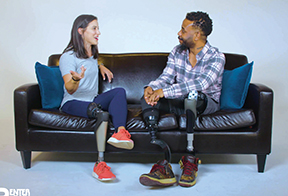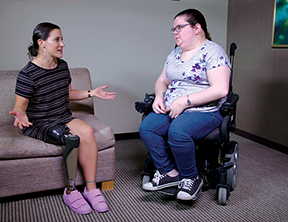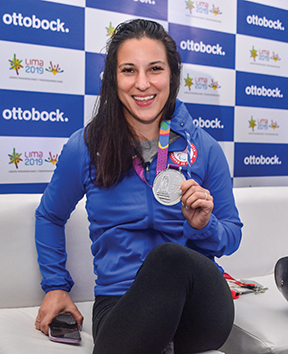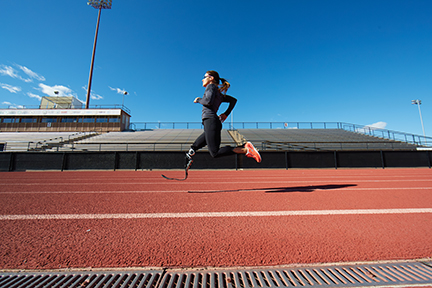By Carolyn Cosmos
Disability rights blogger, podcaster, whirlwind, and social media phenom Lacey Henderson seems to be everywhere these days. At 30, she’s a motivational speaker who recently moved from Austin, Texas, to Denver, has tried stand-up comedy, posts nearly daily disability updates on Twitter, and says Instagram is her most effective platform.
That’s one of the places you can go to watch her interview a wildly diverse array of change-makers, celebrities, artists, athletes, and disability advocates. Or you can tune in to her podcasts on the Picked Last in Gym Class website or YouTube channel.


Her programs, which are laced with humor, are produced by DCP Entertainment in New York, a company that specializes in underrepresented voices.
The purpose of this outreach, Henderson says, is to “normalize disability because it’s so poorly represented across the board.” She wants her Picked Last podcasts to feel like a comedy show—accessible.
Big ideas, yes, and the overarching aim is to take the otherness of outsiders and make it—and them—more recognizable.
Good plan, say scholars of bias such as Jennifer L. Eberhardt, PhD. Toxic categories of others are born not only of personal experience but also of evolution and a “universal function of the brain” that makes it easy to find our tribes. The first step in overcoming prejudices and disparities, Eberhardt states in her 2019 book Biased, is to “discard the assumption that they are inevitable.”
Enter a growing cohort of intense and sometimes rowdy advocates. They can come in surprising packages.
Take Henderson. Given the Picked Last title, you might be surprised to learn she’s paused her podcasts to train for the 2020 Paralympics qualifying competitions.
An above-knee amputee who lost much of her right leg to cancer at age 9, Henderson has a Para world record in the pole vault. In 2019, she won a silver medal in the long jump at the Parapan American Games.
What makes Henderson run? Well, in addition to boundless curiosity and a penchant for people, she was always into sports.
She and her younger brother Trax were raised to value challenges and athletics: Her dad, TJ Henderson, a national decathlon champ, is a retired teacher and coach who still coaches; her mother, Linda Laznovsky, a former Frontier flight attendant, moved on to work in an IT department.
But there’s more to the story. In what was “a pivotal moment” in Henderson’s childhood, she returned to school after her amputation wearing her new prosthetic leg when a basketball game started up during fifth-grade recess. She was feeling like her usual good-at-sports self, she says.
“I’m waiting to get picked—and nobody’s picking me.” She felt confused. “And not only did they not pick me last, they didn’t pick me at all.”
Seeing the Disability, Not the Person
“It was traumatic,” she says. “I thought, ‘People don’t see me.’ That was the moment I knew people thought that what had happened to me had made me less, made me weaker, and not good at recess basketball—which was not the case! And I refused to let that be who I was.” It even brought on a kind of disability denial, Henderson says.
“My parents gave me that fighting power. They said I could do whatever I wanted if I worked hard enough.” She eventually became a gymnast and landed a spot on the cheerleading team at the University of Denver. It wasn’t until after college in 2011 that she tried track and field—and found herself “completely smoked” in her initial competitions.
Then she took off. Henderson was a World Championship top finisher in the long jump in 2013, placed fifth in 2015, and qualified for the Paralympics in 2016. She placed eighth in the women’s long jump. Media attention followed and her time in the spotlight has shaped her advocacy views about disability.

She explored those views with like-minded advocate Emily Ladau in the Picked Last podcast, episode 115. (See sidebar.) Recipient of a 2018 Emerging Leader Award, Ladau is a lively writer and consultant born with Larsen syndrome, a joint disorder that requires wheelchair use.
Ladau pulled no punches: “If we want the world to see us as acceptable, it’s up to us to leave the disability bubble and get the message out,” she said.
What message? Well, for starters: “My disability is not my identity,” Henderson emphasized.
Pushing at that perception is part of their normalization goal. Ladau and Henderson want more focus on talents and interests and less on hardware and history.
And Ladau would like to erase most disability terminology from the face of the earth, starting with the “r” words—retarded and retard.
“I hate it,” she says. And “Why ‘special needs?’ Why are my needs more special than the next person’s?” As for inspiring, she wants to inspire others when she’s giving a good speech, “not because I brushed my teeth this morning.”
On the other hand, Picked Last guest Michael Avon, an anti-bullying advocate and photographer who lost both legs and broke nearly every bone in his body in a motorcycle accident, told Henderson he finds focusing on what he can give to others, including inspiration, helpful. (For more on the inspiration controversy, see “I’m Not Your Inspiration—Or Am I?” at https://bit.ly/2NFVJ4F.)
However, Avon shares the push toward normalization. He thinks companies should increase employee diversity because the more “normal” it is to see people with disabilities, the less of a target they become.
Other guests, such as entrepreneur Joe Dannis, who is deaf and uses sign language to communicate, are also challenging per-spectives and helping normalize disability. Forty years ago, deaf people were thought incapable of running a business, but Dannis is now a business thought leader. Guest RJ Mitte, of Breaking Bad fame, advocates for disabled representation in mainstream media. Lachi—a vocalist, songwriter, composer, producer, and author—was underestimated in school because of her impaired vision. Many of the ideas espoused in the program are relevant to amputees, even though the guests may be able-bodied or have different disabilities and backgrounds.
How Disability Advocates May Be Changing English
The word normalize has lately gotten a bad rap because it sometimes suggests that bad behavior is getting a cosmetic touch-up. But there’s a more profound shift going on.
While the Merriam-Webster dictionary defines normalize as making something conform to a standard or restoring it to a normal condition, it offers this striking example of actual use:
“Dry January can…lead to cultural shifts by normalizing both sobriety and drinking less.” — NBC News, 11 Jan. 2020
And TheFreeDictionary.com offers a similar first definition but lists in second place a very different one: “To cause (something previously regarded as anomalous) to be accepted as normal, thereby altering the accepted norm: ‘The increased visibility of Iraq War amputees has helped normalize the use of pros-theses (Bruce Barcott).’”
Thus, the newest meaning of normalize gives us a discussion of disabilities in the public square. The focus is activism and expansion, not conformity and contraction. It suggests a changing public perception.
Moving people with disabilities from anomalous to ordinary is exactly what the disability activists featured here are trying to do. Described as influencers and thought leaders, they’re not just shifting perceptions. They’re also changing the emotions that perceptions generate in our ancient and often cranky brains—emotions that are geared to tribal survival and come from the most fearful among us.

For More Information
[Lacey Henderson]
Instagram: www.instagram.com/laceyisyourfriend
Facebook: www.facebook.com/Laceyjhenderson
Twitter: www.twitter.com/lacesyourfriend
Website: www.laceyjhenderson.com
Lacey Tries Stand-up Comedy: https://bit.ly/2NIpVvJ
Picked Last in Gym Class: Overcoming Adversity With Humor
Access episodes at www.dcpofficial.com/picked-last-in-gym-class (audio) or on YouTube at https://bit.ly/37ah25Z (video).
Picked Last 106: Musician Lachi on Visual Impairment and Following Life’s Purpose https://bit.ly/2TGHGj1
Website: www.lachimusic.com/index.html
Picked Last 111: Photographer Michael Avon on Healing Through Creativity https://bit.ly/2TCVKtQ
Facebook: www.facebook.com/MichaelAvon
Website: www.michaelavonart.com
Picked Last 113: Deaf Entrepreneur Joe Dannis on Making American Sign Language (ASL) Mainstream https://bit.ly/2G82F68
Website: https://bit.ly/2ubUnaX
Picked Last 115: Activist Emily Ladau on Disabled Representation in Media https://bit.ly/2sGYScX
Website: www.wordsiwheelby.com
Picked Last 116: RJ Mitte on Disabled Representation in Mainstream Media https://bit.ly/37cLITX
Facebook: https://bit.ly/38r0RkT



